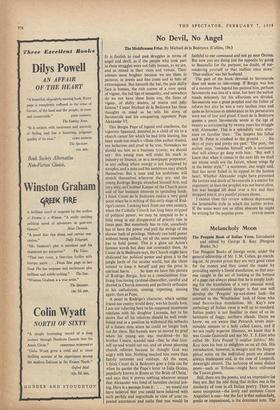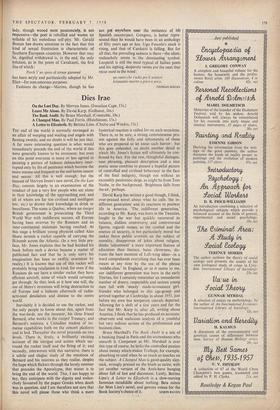Melancholy Moon
THE Penguin Books of foreign verse, under the general editorship of Mr. J. M. Cohen, go march- ing on. At present prices they are very good value for the money and they cosset the reader by providing merely a literal translation, so that any- one caught in the act of looking at the bottom of a page can always plead that he is simply look- ing for the translation of a very unusual word. The only occupational danger is that one will develop the 'Penguin' up-and-down look—the contrast to the 'Wimbledon' look of those who read face-to-face translations. Mr. Kay's new anthology of Italian verse is well up to standard. Italian poetry is not familiar to most of us in- habitants of foggy, northern islands. Dante we know, we are aware that Petrarch wrote inter- minable sonnets to a lady called Laura, and if we are really superior lifesmen, we know that it was Guido Guinizelli and not Mr. T. S. Eliot who called Mr. Ezra Pound fabbro.' Mr. Kay does his best to enlighten us on all this. His introduction, however, is meagre and the biogra- phical notes on the individual poets are almost always inadequate and, in the case of Leopardi, downright absurd. The inclusion of some dialect poets—such as Trilussa—might have enlivened the Tuscan gloom.
Still, there are the poems, and an impressive lot they are. But the odd thing that strikes one is the similarity of tone in all Italian poetry. There are some exceptions—the lively and sardonic Cecco Angiolieri is one—but the fact is that melancholy, gentle or impassioned, is the dominant note. The
lady, though wooed most passionately, is not responsive—the poet is rebuffed and wastes no syllable of his melodious self-pity. Mr. Gerald Brenan has drawn attention to the fact that this kind of sexual frustration is characteristic of Southern European countries. However that may be, dignified withdrawal is, in the end, the only solution, as in the poem of Cavalcanti, the first line of which:
Perch'? no spero di tornar giammai has been wryly and puritanically adapted by Mr. Eliot—for non-amorous purposes.
Fashions do change—Marino, though he has
not got anywhere near the eminence of his Spanish counterpart, GOngora, is better repre- sented than he would have been in an anthology of fifty years ago or less. Ugo Foscolo's stock is rising, and that of Carducci fs falling. But for all that, the prevailing sadness is there—the silent, melancholy moon is the dominating symbol. Leopardi is still the most typical of Italian poets and his sighing, desperate verses are the ones that recur most to the mind : un canto cite s'udia per li Sen tieri lotanando morire a poco a poco.
THOMAS HOGAN



































 Previous page
Previous page